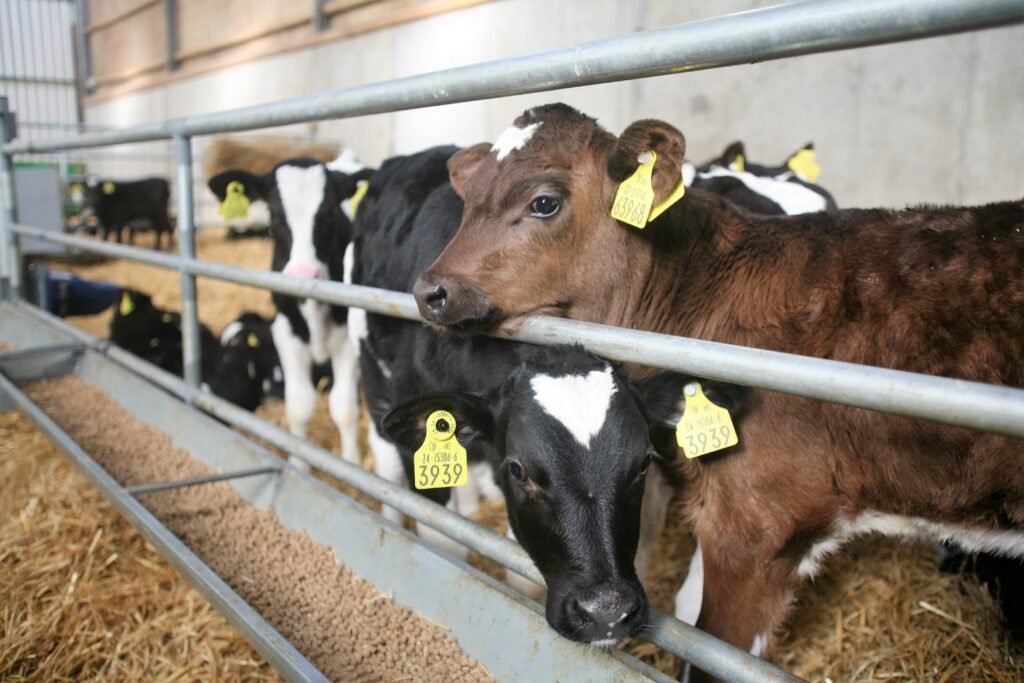Calf management practices, early in life, have far reaching consequences for the profitability of both beef and dairy operations.
Over two million calves are born in Ireland1, but unfortunately far too many fail to reach adulthood because of disease problems.
Calf pneumonia is the biggest known cause of mortality in calves aged between one month and one-year-of-age. It is also a major contributor to the losses that see an average of 14.5% of live born dairy heifers failing to reach their first lactation2.
Calf pneumonia is the greatest single cause of morbidity and mortality in cattle in Ireland – responsible for 32% of deaths in this age group3. It impacts heavily on production costs. The average cost of a pneumonia outbreak has been calculated at a minimum of €49 per sick calf.
Daily liveweight gains, targeted at 0.8kg/day, can drop as low as 0.4kg/day after an episode of respiratory disease4. This growth check increases production costs and can directly result in a reduction in lifetime productivity. Click here for more information on calf pneumonia
Below Ashleigh Fennell – a beef and sheep farmer in Co. Carlow, with a calf-to-beef system – explains how her beef system is based on efficiency and keeping calves healthy is a number one priority.
Calf pneumonia had been a problem with her buying in calves from multiple sources. Fennell saw the knock-on effects with heifers down the line when carcasses were not what she expected.
She’s made changes to her calf management systems and vaccination is a key factor in her animal health plan now. One loss is a huge loss to her business, as Fennell runs a small unit and every calf matters.
https://www.youtube.com/watch?time_continue=6&v=AV4VXXQp7fc
Causes of calf pneumonia
Calf pneumonia results from a complex interaction between disease-causing viruses and bacteria and the animal’s immune system. That is also influenced by external stress factors.
The important viral causes of respiratory disease are bovine respiratory syncytial virus (BRSV), parainfluenza-3 virus (PI-3) and bovine herpes virus-1 (BHV-1); the latter is the cause of infectious bovine rhinotracheitis (IBR).
Bovine viral diarrhoea (BVD) may also be associated with pneumonia in some herds, due to the negative effects it has on an animal’s immune status.
There are a large number of bacteria that can cause disease in their own right, or act as secondary invaders, following viral damage to the lung defence mechanisms.
The important bacteria associated with calf pneumonia are mannheimia haemolytica, pasteurella multocida, histophilus somni and mycoplasma bovis.
An animal’s susceptibility to calf pneumonia will be influenced by the strength of its immune system. In young calves, the single-biggest factor affecting the immune system is colostrum.
Ensuring calves receive good-quality colostrum as quickly as possible after birth will give them the best possible start in life and help reduce the risk of disease.
A calf’s immunity will also be affected by nutrition, management practices, stress and the environment; issues in any of these areas will have a negative impact on the calf’s ability to fight disease.
Mixing animals of different ages or from different sources within the same airspace will increase the risk of respiratory disease.
Similarly – if animals are placed in sheds that are poorly ventilated or humid – even high levels of immunity will not prevent disease outbreaks. Click here for more information on how to minimise the effects of calf pneumonia
Prevention
Given the multi-factorial nature of the disease, good calf pneumonia control programmes rely on implementing an appropriate vaccine strategy, alongside improvements to management practices, to reduce the risk of disease.
Vaccines are available that will enhance protection against the common viral and some of the bacterial causes of calf pneumonia. It is important that vaccines are administered prior to high-risk periods to ensure that there is sufficient time for animals to develop effective immunity.
What is #CALFMATTERS?
#CALFMATTERS is a vaccination campaign from Merial Animal Health, which supports veterinary practices in encouraging farmers that have not vaccinated against calf pneumonia to vaccinate their calves by helping to reduce the overall cost of vaccination. Click here for more information on #CALFMATTERS
References:
- Irish Department of Agriculture, Food and the Marine (2016) AIM Bovine Statistics Report 2016;
- Brickell, et al. (2009) Mortality in HF calves and replacement heifers in relation to bodyweight and IGF-1 concentration on 19 farms in England. Animal 3(8) 1175-1182;
- All Island Disease Report 2015, AFBI/DAFM Veterinary Laboratories;
- Andrews AH (2000) Calf Pneumonia Costs! Cattle Practice 8(2).



